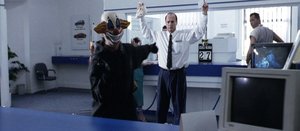
David and Goliath themes have been used to portray banks in film and television since George Bailey took on Mr Potter in Its a Wonderful Life (1946). Citizens take on the greedy corporation – whether it is in a bank robbery, class action lawsuit or an artist lying to apply for a home loan – but banks are rarely portrayed as the good guys. Crises, such as the recent IT glitch that left thousands unable to access their pay, rarely invite public sympathy.
The sexy, handsome and justifiably rebellious bank robbers became par for the course after Bonnie and Clyde (1967). [Check Faye Dunaway’s lipgloss in this clip on YouTube.] Idiot Box subverts this genre by showing hopeless criminals trying to escape the boredom of living in suburbia by holding up a bank.
The movie The Bank (2001) is the classic story of greed and corruption, of bullying and the lack of compassion in our society. When the bank’s processes are applied to the dippy Maggie Beare (Ruth Cracknell) in the episode of Mother and Son called 'The Money’ (1984), we ask ourselves whether Maggie or the bank is ridiculous?
Of course, banks portray themselves as reliable, trustworthy and a gateway to an affluent life. In 1937, an ad for the Rural Bank of New South Wales promotes the ‘man on the land’ who prospers with a lifelong relationship with one bank – definitely a thing of the past. The Commonwealth Bank – still a government body in 1939 – uses animation, animals and a fable to extol the virtues of saving money to schoolchildren.
Finally, the relationship between filmmaking and banks is rarely smooth, as shown in Making Venus (2002), which records in painful detail what happens when the money owed making an ill-prepared film becomes overwhelming. The worse things get for the film, the better this documentary becomes.










